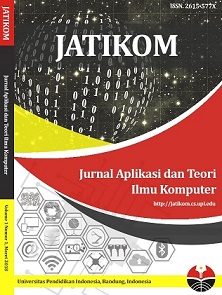Penerapan Finite State Machine pada Squid Game Berbasis Dekstop Menggunakan Unity 3D
Abstract
Abstract— The emergence of modern games has resulted in children tending to play gadgets and leave traditional games. This study aims to develop a traditional 3D themed game that adapts the desktop-based Squid Game series. Squid Game 3D will be developed by applying the Finite State Machine (FSM) control system design method. In designing the game, the researchers used the Multimedia Document Life Cycle (MDLC) development method which consisted of the concept, design, material collection, assembly, and testing. The concept adapts the Red Light Green Light game found in the Squid Game film. Game designed using UML, Storyboard, and FSM. Materials needed in include writing titles, pictures of characters and images as game backgrounds. Furthermore, the game is made by coding and creating an interface using Unity 3D, Visual Studio Code, and 3D Viewer. As a result, a desktop-based 3D Squid Game was successfully developed next tested using the black box testing. and the result was that all system functions in Squid Game 3D were successfully run.
Keywords
Full Text:
PDFReferences
Armanda, A. F., & Rizqi, M. (2020). Game 3D Perjuangan Rakyat Surabaya Dalam Pertempuran 10 November 1945 Dengan Belanda Menggunakan Unreal Engine. Journal of Animation and Games Studies, 6(2), 87–96.
Oey, S. (2021). 7 Permainan Anak di Squid Game, Berani Coba? Retrieved from Ruparupa: https://www.ruparupa.com/blog/permainan-squid-game/
Hormansyah, D. S., Astiningrum, M., & Asyraq, F. A. (2020). Implementasi FSM (Finite State Machine) Pada Game Surabaya Membara. JIP (Jurnal Informatika Polinema), 6, 11–17.
Jones, M. T. 2015. Artificial Intelligence: A Systems Approach: A Systems Approach. Jones & Bartlett Learning.
Rafi, A., & Tahtawi, A. (2016). Implementasi Metode Finite State Machine (FSM) sebagai Dasar Algoritma Robot Line Follower. Jurnal Enjinering Dan Ekonomi (JEE), 1, 6–11.
Rahadian, M. F., Suyatno, A., & Maharani, S. (2016). Penerapan Metode Finite State Machine Pada Game “THE RELATIONSHIP.” Jurnal Informatika Mulawarman, 11(1), 14–22.
Ramadijanti, N., Setiowati, Y., & Fathoni, K. (2015). Penerapan Finite State Machine Pada Perilaku Karakter. FT UGM, 30-36.
Bimantoro, T., & Hanny, H. (2016). Pemodelan Perilaku Musuh Menggunakan Finite State Machine (FSM) Pada Game Pengenalan Unsur Kimia. Journal of Applied Intelligent System, Vol.1, No. 3.
Hernawan, S. R. (2018). Penerapan Metode Finite State Machine Pada Game “The Mahasiswa” Guna Membangun Perilaku Non Playable Character. Skripsi Universitas Islam Indonesia.
Kusumayanti, D. D., Mukharomah, K. N., Wijayanti, E. C., Andriaka, R., & Sasli, S. A. (2022). Analisis Aspek-Aspek Hegemoni Dan Dominasi Sosial Ekonomi Dalam Serial ‘Squid Game.’ Jurnal Entitas Sosiologi, 11(2).
Anshori, I. F. (2022). Perancangan Game “Last Night” Menggunakan Unity 3D. Jurnal Responsif, 4(2), 168–172.
Haromunthe, J. P., & Riyanto, J. (2022). Pembuatan Game 3D Corona Survival Menggunakan Unity Berbasis Android. OKTAL : Jurnal Ilmu Komputer Dan Science, 1(09), 1355–1359.
DOI: https://doi.org/10.17509/jatikom.v7i1.60718
Refbacks
- There are currently no refbacks.
Copyright (c) 2024 Universitas Pendidikan Indonesia (UPI)

This work is licensed under a Creative Commons Attribution-ShareAlike 4.0 International License.
JATIKOM is published by Universitas Pendidikan Indonesia
Jl. Dr. Setiabudhi 229 Bandung 40154, West Java, Indonesia
Website: http://www.upi.edu













